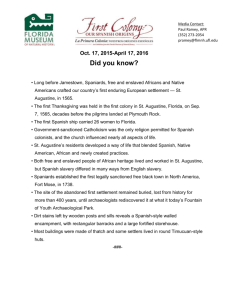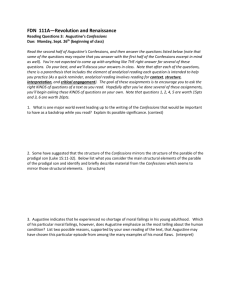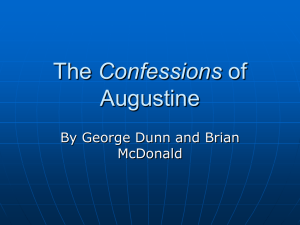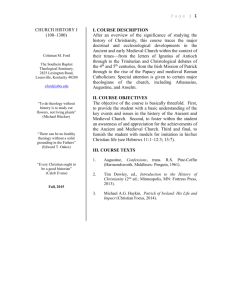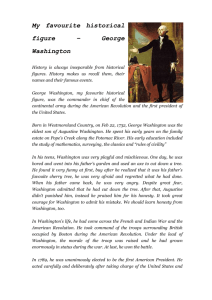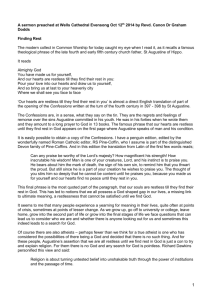A Summary and Outline of Augustine's 'Confessions' Rev. Charles R
advertisement
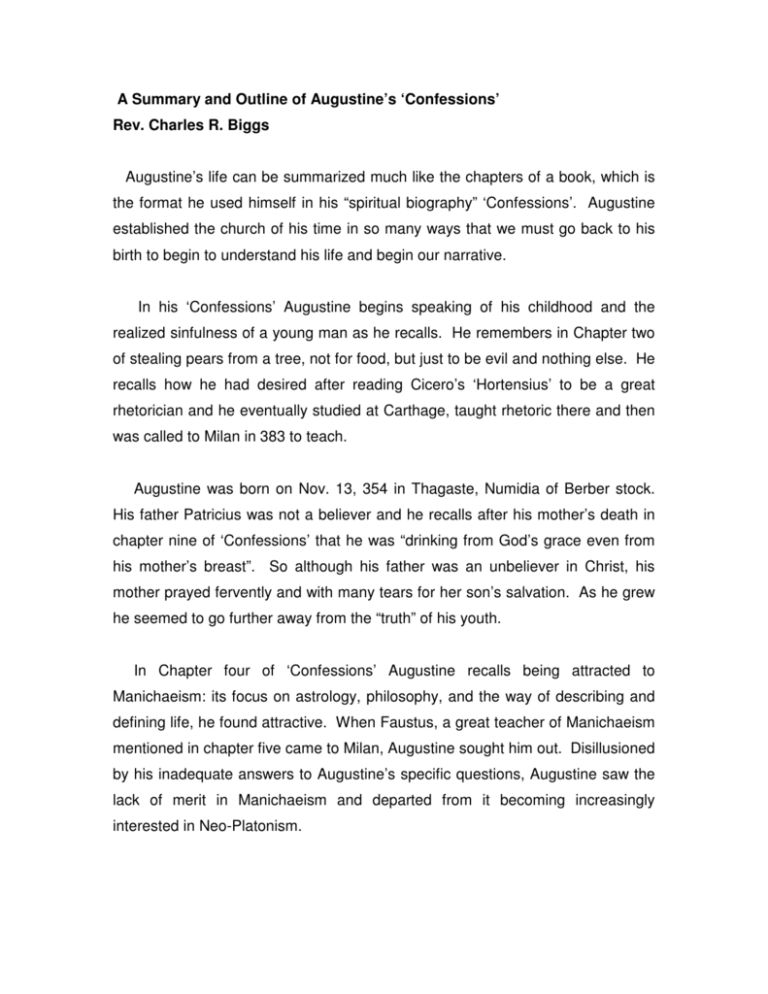
A Summary and Outline of Augustine’s ‘Confessions’ Rev. Charles R. Biggs Augustine’s life can be summarized much like the chapters of a book, which is the format he used himself in his “spiritual biography” ‘Confessions’. Augustine established the church of his time in so many ways that we must go back to his birth to begin to understand his life and begin our narrative. In his ‘Confessions’ Augustine begins speaking of his childhood and the realized sinfulness of a young man as he recalls. He remembers in Chapter two of stealing pears from a tree, not for food, but just to be evil and nothing else. He recalls how he had desired after reading Cicero’s ‘Hortensius’ to be a great rhetorician and he eventually studied at Carthage, taught rhetoric there and then was called to Milan in 383 to teach. Augustine was born on Nov. 13, 354 in Thagaste, Numidia of Berber stock. His father Patricius was not a believer and he recalls after his mother’s death in chapter nine of ‘Confessions’ that he was “drinking from God’s grace even from his mother’s breast”. So although his father was an unbeliever in Christ, his mother prayed fervently and with many tears for her son’s salvation. As he grew he seemed to go further away from the “truth” of his youth. In Chapter four of ‘Confessions’ Augustine recalls being attracted to Manichaeism: its focus on astrology, philosophy, and the way of describing and defining life, he found attractive. When Faustus, a great teacher of Manichaeism mentioned in chapter five came to Milan, Augustine sought him out. Disillusioned by his inadequate answers to Augustine’s specific questions, Augustine saw the lack of merit in Manichaeism and departed from it becoming increasingly interested in Neo-Platonism. Augustine’s understanding of Neo-Platonic thought would stay with him throughout his great interpretations of theology, philosophy, and even to his death bed. He had been sitting under the teaching of Ambrose, Bishop of Milan (d. 397) and he was fascinated by his allegorical interpretation of Scripture, especially helping Augustine to overcome his distrust of the Old Testament. Eventually his mother Monnica’s prayers were answered for her son’s salvation. The Lord had mercy upon Augustine in his garden. He was in his garden with Adeodatus (his son by a concubine, years earlier), Alypius his friend and was converted after hearing children singing “Tole lege, tole lege”, which means “pick up and read”. Augustine recounts how the voice of the children caused him to open the Bible that was there and to a passage in Romans 13:1214. This conversion occurred in 386 and in ‘Confessions’ he writes of the incident in chapter eight. The following Easter he was baptized by Ambrose. Although Augustine desires to retreat for study of the Scriptures, by 391 his reputation and intellect is well-known. He becomes Presbyter, or priest of Hippo (N. Africa) in 391, then he becomes Bishop of Hippo Regius by 396. His intellectual gifts have been inherited by the Church through the ages. His correct understanding of Christianity and culture has been most influential. In distinction from Tertullian who said: “Credo quia absurdum est” – “I believe because it is absurd”, Augustine said: “Credo ut intelligam” – “I believe in order to understand.” From his accounts of the intellectual past in ‘Confessions’ the only thing Augustine got himself was Neo-Platonism and Manichaeism. He believed, so that he might correctly understand. John Calvin in the 16th century will build on this in Book I of his “Institutes in the Christian Religion” who says “Knowledge of God is true knowledge of self.” From this Augustine believed we were to take the best from culture and use it for Christianity (Jerome’s “spoiling of the Egyptians”). In addition to culture, and a right way to understand it, Augustine gave us a right understanding of man’s ability. In ‘Confessions’ Book X, he discusses the sin’s of man and he uses Pauline language about the inability to overcome. Man is a mass of sin, under the wrath of God (John 3:17-21). He could only do what he pleased, what he loved to do, but not any good that was God-ward because it was mixed with sin. In opposition to Pelagius he described that man was able to choose and have freewill, but unless by God’s grace, he would never seek after God (Rom. 3). He describes man as: 1) In the garden ability- posse peccare, pecarre et moriability to sin or not to sin and die; 2) non posse non peccare- not able not to sin which was man’s condition in his fallen state; 3) posse peccare- (not in writings, but conclusion from other writings) ability, able to not sin- because of our position “in Christ” which is the Christian position even today from Romans chapter 6-8. He gave to us a first understanding of soteriological and anthropological ability of man from the Scriptures. Another contribution Augustine made was with the study of history. Most Greeks interpreted history as cyclical- “history as repeating itself”, but Augustine stressed a biblical, linear comprehension of history. Isadore of Seville (ca. 8th c.) would establish the way of time measurement “BC – AD” from this influence. Another contribution would be the doctrine of church and state. This might be his most negative contribution. When the Donatists were a threat to N. Africa in the early 5th c. while Augustine was Bishop, he used the force of the state and “Theodosius’ Law” of 380 (empire is Christian and should hold to the teachings of Peter). This use would later be leveled against “Augustinian” Calvinists in France in the 17th century by Boussuet. The later Bishops of Rome would use Augustine’s teaching on the Church, particularly in “Against the Donatists” to establish the hierarchy and papal power. Pope Gelasius (492-496) spoke of the “Two Swords Theory”. He said that the Pope had “authoritas” or power over the emperor, but the emperor “potestas” ability to apply the decisions of the Pope. The Roman Church used this and built upon this teaching of Augustine through its pinnacle of power in Innocent III (late 12th c.). Augustine’s influenced of the Church and all of society has been overwhelming. He contributed and was the father “theologically” of the Reformation doctrines of grace, knowledge, or epistemology found in God primarily, et cetera., but paradoxically gave birth to what Calvin would later call “The Heretical Romanist Church” called Medieval Roman Catholicism. Using ‘Confessions’ as our guide through Augustine’s life, it is important to see from his birth to adulthood all the influences on his life that would later effect his thinking- -and the whole church. There has arguably never been another more influential person, and while covering the “basic” parts of life and thought. It would take so much more to account for the influence he had. From Book I of ‘Confessions’ to the Book XIII on Genesis we can see how Augustine has shaped and influenced our thinking. Particularly in the “individual” salvation consciousness of sin that is stressed in Protestant churches today. Most particularly in Book X where he describes the life “in the body” and the constant fight of the flesh. His many other writings are important as well, in addition to ‘Against Pelagius’ and ‘Against Donatists’ - - He wrote ‘City of God’ expressing the two kinds of people in the world: amor sui (lovers of self) and amor dei (lovers of God). He points out in this book the “splendid vices” that Rome had in their government as a fallen people and Christianity could use for God’s glory. Unfortunately, this would form the Medieval Church, which we would need Augustine’s other writings on man and salvation to break us away from his other teaching. He also wrote “On the Trinity” and at end of his life he wrote “Retreactiones”- reassessing and reworking some of his earlier, theological thought. Augustine died as Bishop of Hippo, as the Vandals were waiting to lay claim to the city. He died reading the penitential psalms on his bedroom ceiling, and with a quote from the Neo-Platonist Plotinus- - “Do not weep for me, this is only the end of my flesh (body).” He died on August 28, 430. CRB Buy this book: www.amazon.com

